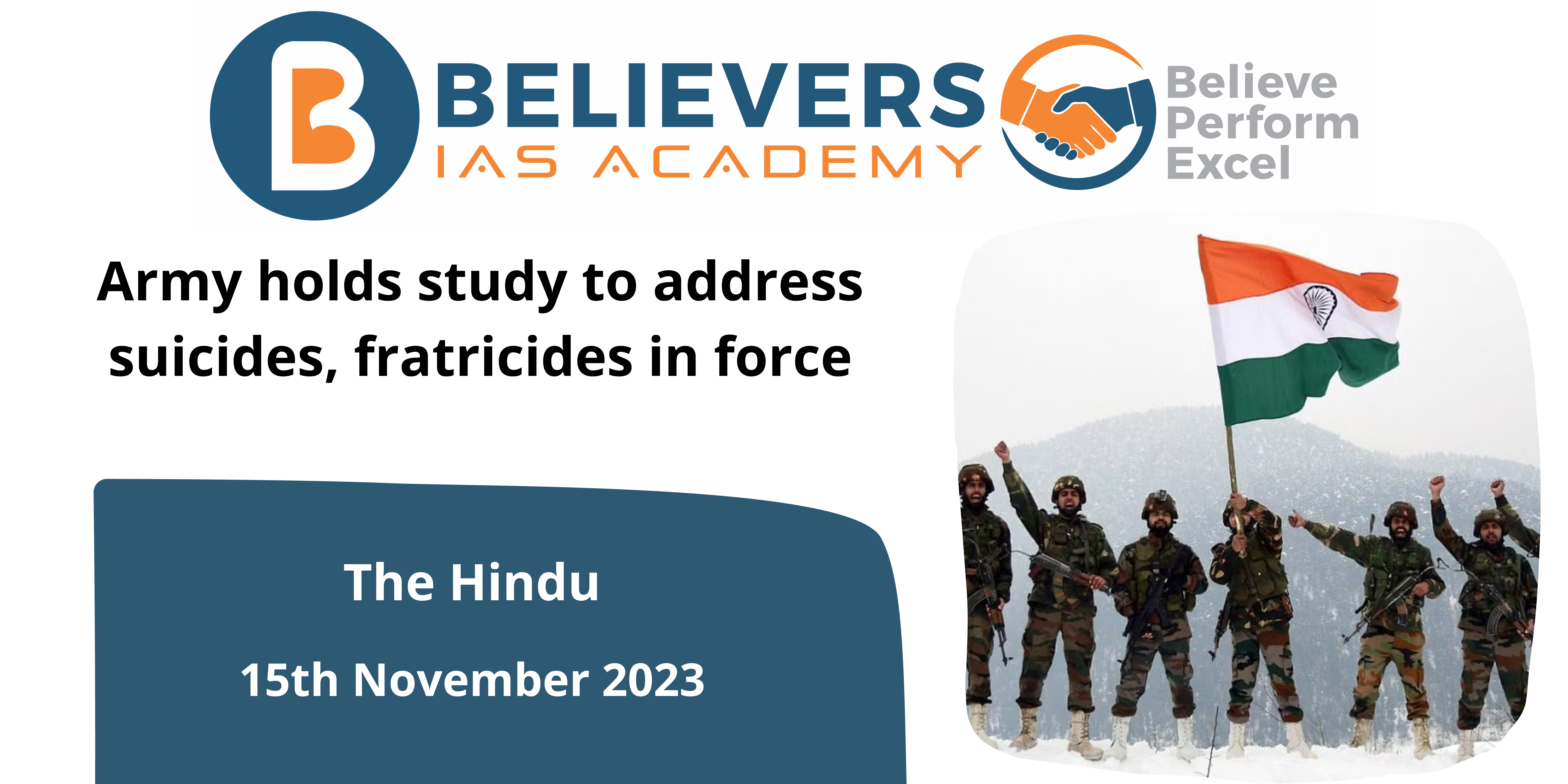Army holds study to address suicides, fratricides in force
Context
In August 2023, the Army launched a study in collaboration with the Defence Institute of Psychological Research (DIPR) to assess the mental health of troops and their families as part of measures to address stress and psychological issues and reduce the number of suicides and fratricides in the force.
What was the purpose of the study conducted on the troops?
- The Indian Army launched a study in August 2023 in collaboration with the Defence Institute of Psychological Research (DIPR) to assess the mental health of troops and their families.
- A pilot project is also underway to gauge the mental well-being of military personnel and their families.
How is the study conducted?
- Every year, thirty officers are trained at DIPR, demonstrating the organization’s dedication to continued professional development in psychological assistance.
- “Religious teachers counsellor courses” are held for four weeks at several military hospitals, emphasizing the necessity of managing mental health holistically.
- Recognizing the necessity for specialized training, a 12-week Unit Psychological Counsellor Course is conducted for Junior Commissioned Officers and Non-Commissioned Officers.
What are the statistics of the studies conducted regarding the mental health of our troops?
- Parliamentary data from April 2022 demonstrate the existence of fratricide cases, emphasizing the importance of tackling mental health issues.
- Data from 2016 to 2018 show a fluctuating number of suspected suicide cases in the Army, underscoring the pervasiveness of the problem.
What are the effects of the poor mental health of our troops?
- Reduced operational efficiency: Soldiers suffering from mental illness may struggle to perform their responsibilities successfully, resulting in a reduction in overall operational preparedness. Impaired decision-making, decreased focus, and slowed reaction times can all have a negative impact on the success of military missions.
- Accidents and errors are more likely: Fatigue, worry, and stress can all be exacerbated by poor mental health, increasing the chance of accidents and blunders during military operations. Mental wellness is critical in high-stakes, high-pressure circumstances for retaining situational awareness and making appropriate judgments.
- The Effect on Unit Cohesion: Relationships within military units can be strained by mental health difficulties, compromising unit cohesion and teamwork. In military operations, trust and efficient communication are critical, and poor mental health can impede the establishment and maintenance of these critical factors.
- Increased Fratricide and Suicide Rates: Soldiers who have mental health issues may be more likely to injure themselves or their fellow soldiers. When mental health concerns are not appropriately handled, fratricide (deliberate death of one’s comrades) and suicide rates may rise.
- Morale is down: Poor mental health might lead to troops’ low morale. Low morale can have repercussions on motivation, discipline, and overall unit morale. A demoralized force may find it difficult to retain resilience in the face of adversity.
What is the way forward in improving the situation?
- Intervention and early detection: To spot difficulties early, all military members should undergo regular mental health tests. Create explicit protocols for detecting and responding to indicators of mental health problems.
- More Mental Health Education: Give military soldiers, their families, and commanding officers comprehensive mental health education and awareness programs. Encourage a culture that views seeking help for mental health difficulties as normal.
- Expanding and improving training programs that focus on stress management, resilience building, and coping skills. Include mental health components in your regular physical fitness and general well-being training.
- Access to Counseling and Support Services: Ensure that military members and their families have easy access to confidential mental health counselling services. Use civilian counselors in addition to military personnel to provide a variety of perspectives and skills.
- Encourage unit cohesion and the use of support systems: To promote unit cohesion, provide a friendly and inclusive environment inside military units. Create buddy systems and peer support initiatives to urge soldiers to look out for one another




